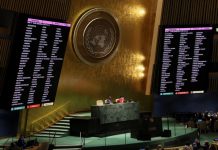A comprehensive report compiled by the National Intelligence Council of the US warned about the fragility of the world order—the global network of trade relations, codependent economies and international financial institutions— in the face of the need for a coordinated response to global challenges such as COVID-19 pandemic or climate change, the New York Times reported.
The report was published this past Thursday about the potential fragmentation of society and the global order that could lead to disruption of international trade and create an online enclave for a group of countries leading to an erosion of social cohesion.
The publication reported that the report, compiled every four years by the National Intelligence Council, mixes more traditional national security challenges like the potentially disruptive rise of China with social trends that have clear security implications, like the internet’s tendency to exacerbate political and cultural divisions. A previous version of the report, released by the Obama administration in 2017, highlighted the risk of a pandemic and the vast economic disruption it could cause — a prescient prediction in hindsight.
“Efforts to contain and manage the virus have reinforced nationalist trends globally, as some states turned inward to protect their citizens and sometimes cast blame on marginalized groups,” the report said.
“The response to the pandemic has fueled partisanship and polarization in many countries as groups argue over the best response and seek scapegoats to blame for spreading the virus and for slow mitigation efforts,” NYT highlighted, “The global trends report — unlike the intelligence agencies’ annual threat assessment — is not supposed to look at immediate challenges. Instead, the report takes a longer-term, strategic look, trying to peer 20 years ahead to examine how current changes could transform the world of the future.”
The council that published the report serves as the advisory council that provides long-term strategic analysis for the director of national intelligence. Part of this includes regularly producing reports and assessments for officials and the National Security Council.
“The report predicted that current trends would make global politics more volatile. On the international stage, China will continue to challenge the United States and the Western-led world order, and politics in certain countries will become more contentious, officials predicted,” said the New York Times, “Climate change was also a focus of the report, which noted the difficult adaptations that countries would need to make, such as building rainwater storage and reinforcing sea walls. Climate change would further drive global migration, which is already increasing, the report predicted. Technological innovation and cooperation between China and the West are keys to adapting to climate change, demographic shifts and other challenges, it said.”
Studying trends of economic deprivation, the report warned that income inequality could rapidly rise, and could be deeply tied with information inequality. This information inequality is the trust deficit between the public and institutions, creating a segregation in society between those who trust the institutions and those who see it as a mass disinformation mechanism. Such findings bring into the forefront the ideas of fake news and alternative facts, concepts that had seen a rising popularity in the USA under the Trump administration.
The problem is made worse by technology, wrote the NYT, algorithms, social media and artificial intelligence have replaced expertise in deciding what information spreads most widely, and that has made the public more vulnerable to misinformation. Still, positive demographic changes in recent decades, with people moving out of poverty and into the middle class, had created “rising expectations,” said Maria Langan-Riekhof, the director of the intelligence council’s strategic futures group. But fears of falling income across the globe are growing, a worrisome trend when coupled with changes in how information is shared and social divisions have deepened.
“Those concerns are leading people to look for the security of trusted voices, but also of like-minded groups within their societies,” Ms Langan-Riekhof said while talking to the publication. “Overlay those trends I’m describing, and you kind of see that recipe for greater divisions, increasing fracturing. We think that is likely to continue and probably worsen.”
Over time, the report said, these trends could weaken democratic governments. “At the same time that populations are increasingly empowered and demanding more, governments are coming under greater pressure from new challenges and more limited resources,” the report said. “This widening gap portends more political volatility, erosion of democracy and expanding roles for alternative providers of governance. Over time, these dynamics might open the door to more significant shifts in how people govern.”
The publication further wrote that the global trends report has often looked at possible future situations. In the 2017 report, one example contemplated a pandemic plunging the world into economic chaos. It envisioned nationalistic politicians eroding alliances, a drop in oil prices causing calamity and more isolationist trade practices. It also forecast a pandemic (albeit in 2023, not 2020), which restricted travel, caused economic distress and exacerbated existing trends toward isolation. The report has discussed the risk of a pandemic for nearly two decades, said Gregory F. Treverton, a former chairman of the National Intelligence Council who helped lead the 2017 effort. The 2004 report said some experts believed it was “only a matter of time” before a pandemic, he said.
“It was talking about a scenario exactly like what’s happened: a major global pandemic that shut down global commerce, air travel,” George F. Treverton said while talking to the NYT. “The reports have been strategic warnings, and that is how I think of them, helping people who want to be strategic.”
“The new report credited the previous documents for highlighting the potential for new diseases and pandemics but acknowledged that “we lacked a full picture of the breadth and depth of its disruptive potential.” For the new effort, the National Intelligence Council looked at which trends the coronavirus pandemic was accelerating and which were slowing,” NYT reported.
“Much like the terrorist attacks of Sept. 11, 2001, the Covid-19 pandemic is likely to produce some changes that will be felt for years to come and change the way we live, work and govern domestically and internationally,” the report said. “How great these will be, however, is very much in question.”
The publication concluded, even before the spread of the coronavirus, National Intelligence Council analysts were examining the idea of more shared global challenges. But the coronavirus, Ms. Langan-Riekhof said, “really drove it home for us. Challenges aren’t going to stay within the borders of a single country anymore, and we’re going to feel them globally much faster,” she told the NYT. “This may be a foreshadowing of things to come.”









